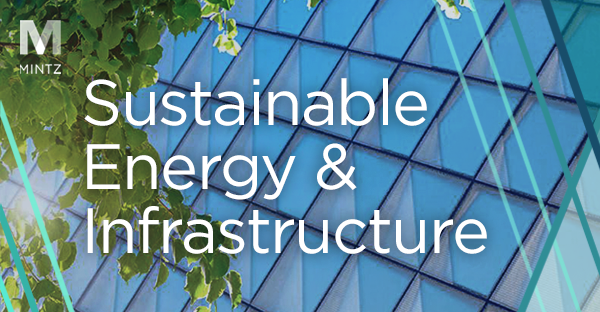Energy & Sustainability Legal Feature — The Recently Announced Federal-State Partnership to Accelerate the Development of Offshore Wind Projects
On June 23, the White House announced the launch of a Federal-State Offshore Wind Implementation Partnership to accelerate the development of US offshore wind projects. This partnership is a joint effort of the Biden administration and governors from 11 East Coast states: Connecticut, Delaware, Maine, Maryland, Massachusetts, New Hampshire, New Jersey, New York, North Carolina, Pennsylvania, and Rhode Island.[1]
The White House hopes to expand this federal-state collaboration to include states along the West Coast and the Gulf of Mexico.
This federal-state collaboration furthers the Biden administration’s objective of deploying 30 gigawatts (GW) of US offshore wind by 2030, which is projected to result in private investment of $12 billion per year in offshore wind projects, support nearly 80,000 jobs, provide enough energy to power more than 10 million homes, and cut 78 million metric tons of carbon dioxide emissions.[2]
Domestic Supply Chain Commitments
A focal point of this partnership will be the domestic supply chain needed to achieve state and federal offshore wind goals. In conjunction with the White House announcement, the federal government and state governments participating in the partnership endorsed a set of commitments to bolster and develop the manufacturing facilities, port capabilities, logistics networks, and workforce needed for that domestic supply chain.
The joint commitments on the part of the federal government and state governments include collaborating to enhance the domestic supply chain network for the offshore wind industry; working together to address commonly identified high-priority gaps within the offshore wind industry and to facilitate regional solutions; coordinating with local governments, underserved communities, and other stakeholders to develop a domestic supply chain that yields equitable benefits and avoids potential adverse impacts; exploring opportunities to align offshore wind procurements with offshore wind lease auctions; and supporting the development of a domestic fleet of vessels to install, service, and maintain offshore wind facilities.
On its part, the Biden administration also committed to facilitating permitting and environmental reviews for offshore wind projects and lease sales, which is an integral and sometimes lengthy step in offshore wind development.
Domestic Supply Chain Roadmap
The White House announcement also noted progress on a comprehensive national offshore wind supply chain roadmap that is in progress and will identify key pathways for meeting state and federal offshore wind goals. The roadmap is being developed by a collaboration led by the Department of Energy, with support from the National Offshore Wind Research and Development Consortium and funding from the Department of Energy, New York, and Maryland. The first part of the roadmap is a report released by the National Renewable Energy Laboratory (NREL) in March 2022 detailing the domestic supply chain needs – including components, ports, and vessels – for the achievement of the White House’s goal of 30GW of offshore wind by 2030. The second part of the roadmap, expected to be released by the end of this year, will identify realistic pathways to achieve a domestic supply chain, assess the potential benefits of such a supply chain, and determine the readiness of existing industries to support supply chain development.[3]
Priority Financing for Specialized Offshore Wind Vessels
In order to help achieve state and federal offshore wind goals, the Department of Transportation’s Maritime Administration (MARAD) announced the designation of vessels used in the construction, service, or maintenance of offshore wind facilities as “Vessels of National Interest” for purposes of the Federal Ship Financing Program (commonly referred to as “Title XI”). The Title XI program provides financing that supports the building and retrofitting of vessels and the modernizing of shipyards. By designating vessels used in the offshore wind industry as “Vessels of National Interests,” applications relating to these specialized vessels will have priority for review and funding over other applications. This should increase the supply of these specialized vessels, which will be needed in order to accelerate the development of offshore wind projects and achieve state and federal offshore wind goals.[4]
Building on Prior Momentum
The White House announcement builds upon the Biden administration’s existing efforts to develop the US offshore wind industry. In particular, the Biden administration has already approved the first two commercial-scale US offshore wind projects – Vineyard Wind in Massachusetts,[5] and South Fork Wind off Rhode Island and New York.[6] The Biden administration also announced its objective to hold up to seven offshore wind auctions by 2025.[7] Two such auctions – in the New York Bight area and the Carolina Long Bay area – occurred earlier this year. The New York Bight auction brought $4.37 billion in winning bids,[8] and the Carolina Long Bay auction brought $315 million in winning bids.[9]
The federal-state partnership announced by the White House is a first-of-its-kind collaboration that reflects the strong commitment of the Biden administration and the participating states to offshore wind development. Building on the progress that has already occurred in the US offshore wind industry over the last several years, the announcement of this partnership and the associated commitments could further accelerate investment and participation in the industry.
Endnotes
1 https://www.whitehouse.gov/briefing-room/statements-releases/2022/06/23/fact-sheet-biden-administration-launches-new-federal-state-offshore-wind-partnership-to-grow-american-made-clean-energy/
2 https://www.energy.gov/articles/energy-secretary-granholm-announces-ambitious-new-30gw-offshore-wind-deployment-target
3 https://www.energy.gov/eere/articles/report-outlines-supply-chain-needs-achieve-offshore-wind-2030-goal
4 https://www.maritime.dot.gov/newsroom/dot-joins-new-federal-state-partnership-expand-domestic-offshore-wind-supply-chain
5 https://www.doi.gov/pressreleases/biden-harris-administration-approves-first-major-offshore-wind-project-us-waters
6 https://www.doi.gov/pressreleases/interior-department-approves-second-major-offshore-wind-project-us-federal-waters
7 https://www.doi.gov/pressreleases/secretary-haaland-outlines-ambitious-offshore-wind-leasing-strategy
8 https://www.doi.gov/pressreleases/biden-harris-administration-sets-offshore-energy-records-437-billion-winning-bids-wind
9 https://www.doi.gov/pressreleases/biden-harris-administration-announces-winners-carolina-long-bay-offshore-wind-energy
Authors
Kristopher L. Kirkwood
Member



